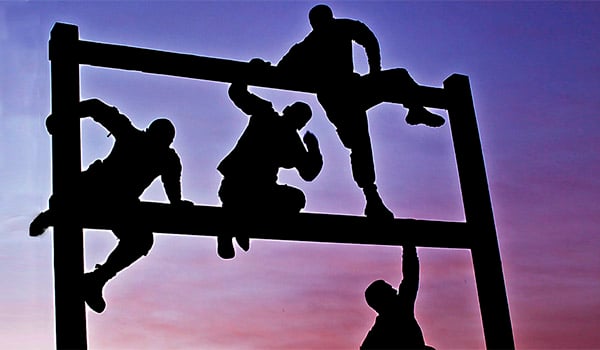
Ask the Flight Surgeon / By LTC Roger Williams, M.D. & CPT Karl Swinson, M.D.: Q: Last year I started an over-the-counter testosterone booster. Now I hear a testosterone guideline has been published. Should I stop, change, or continue my current medication?

army.mil photo
FS: No aeromedical policy letter (APL) existed when this crew member started supplementation of testosterone (an androgen). However, all flight personnel should contact their aeromedical provider before starting any medications, including over the counter (OTC) medicines or supplements.
Current Army Regulations?
The new Hypogonadism APL requires aeromedical providers to screen for: diabetes, obstructive sleep apnea, obesity, exposure to chemotherapy/testicular radiation, HIV/AIDS, chronic narcotic/corticosteroid use, and pituitary dysfunction. If no alternate cause for your complaint is found, a testosterone lab should be drawn. If low, that lab will be repeated a week later.
While not required by the APL, some providers prescribe a few weeks of a holistic fitness program that includes improved sleep, exercise, and weight loss. These measures often successfully address symptoms and can resolve lab abnormalities without requiring medications and their possible side effect. Should the patient on flight status meet the criteria for hypogonadism as per current US medical guidelines, then supplementation to replace to normal testosterone levels is acceptable. The key point is “normal” levels.
Medical misuse and risks of over-use or unregulated use?
Misuse of testosterone is becoming far too common. Many seek various means of improving athletic performance. Health benefits from androgens and androgen precursors do exist, including improved strength, muscle mass, and libido. However, many men use doses that push their blood levels above acceptable limits, which puts their cardiovascular and endocrine health in jeopardy. Known side effects of these substances include potentially career-ending events like blood clots, heart attack, and strokes. Testosterone use is also contraindicated with history of prostate cancer, heart disease, stroke, and elevated blood counts. In addition, the usage of other medications, herbs, or supplements to affect testosterone levels, such as aromatase inhibitors or Clomid, is not looked on favorably unless prescribed for another recognized medical condition that will not hinder Aviation safety.
Testosterone uses in other populations
Women use testosterone for menopausal symptoms and sexual dysfunction. There is no current agreement about the appropriate usage and levels for women. The Hypogonadism APL applies only to men so usage in women should be evaluated and cleared on a case-by-case basis.
Transgender men, born biologically as women, use testosterone to produce male physical characteristics like male pattern body and facial hair and musculature. The Sexual and Gender Identity Disorder APL does not mention testosterone but says any medication use is disqualifying. The APL says a waiver is possible if the condition does not impact Aviation performance.
AIDS wasting syndrome, the significant loss of weight in advanced HIV, is sometimes treated with testosterone. Testosterone can result in weight gain and increased lean muscle mass. Treatment of advanced HIV based on the HIV Infection APL would be disqualifying for flight duties.
Will testosterone use affect my military service or deployability?
Yes. Hypogonadism is an actual medical condition for which testosterone supplementation can be appropriate. However, taking doses above those listed in the current Army Aeromedical Policy letter on male hypogonadism is grounds for being relegated to duties not involving flight (DNIF). Please note that refusal to reduce testosterone doses to the levels outlined in the current hypogonadism APL is considered steroid abuse punishable under UCMJ article 112.
There are also many concerns regarding the use of testosterone clinically. Exogenous testosterone is associated with cardiac problems including heart disease, heart attacks, hypertension, and strokes. Testosterone supplementation can also cause increased estrogen levels in males through a biochemical process known as aromatization that converts testosterone to estrogen. Moreover, testosterone contributes to weight gain, not weight loss.
Air crew must also understand that OTC men’s health pills, performance enhancers, and testosterone boosters are restricted (non-waiverable) Class 4 medications. Men who have elevated testosterone levels should have their dosage decreased and must be grounded temporarily due to the potential for withdrawal side effects.
Your flight surgeon must coordinate with the theater surgeon and have a testosterone waiver issued like the one required for flight duty. Should the aviator need medication changes or have significant side effects just before or during deployment that waiver will likely be denied. Unauthorized or electively increasing the dosage of testosterone or supplements must not be done as it may compromise both your life and your career.
Fly safe!
Questions for the Flight Surgeon?
If you have a question you would like addressed, email it to This email address is being protected from spambots. You need JavaScript enabled to view it..”>This email address is being protected from spambots. You need JavaScript enabled to view it.. We will try to address it in the future. See your unit flight surgeon for your personal health issues. The views and opinions offered are those of the author and researchers and should not be construed as an official Department of the Army position unless otherwise stated.
LTC (Dr.) Roger Williams and CPT (Dr.) Karl Swinson are flight surgeons at the U.S. Army School of Aviation Medicine, Fort Rucker, AL.








